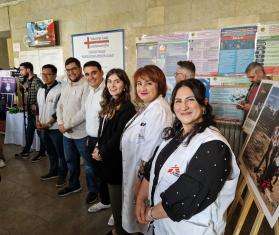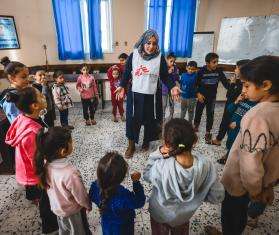A Letter from Dr. Africa Stewart
Dear friends,
At Doctors Without Borders/Médecins Sans Frontières (MSF), we know that our principles of impartiality and neutrality are not synonymous with silence. One of the things that sets our movement apart from other medical humanitarian groups is our commitment to bearing witness to the experiences of the people and communities for whom we work—and speaking out when the world turns its back on crises.

We don’t have to work hard to keep some emergencies in the headlines. 2022 was a year marked by high-profile crises. From caring for people living through the war in Ukraine to responding to a rare outbreak of Ebola in Uganda to helping migrants and asylum seekers stranded at the southern US border, MSF teams were on the ground responding to the emergencies that dominated the news around the world.
But what about the crises that take place outside the spotlight? This work can be extremely challenging. What does it mean to bear witness when it sometimes feels like the world is too preoccupied to care?
In this issue of Alert, another installment in our annual “Year in Photos” series, we’re choosing to highlight some of the world’s underreported humanitarian emergencies, and the work MSF is doing to respond to them. We’ve asked MSF staff members from our medical projects around the world to reflect on what it means to them to bear witness. For many, this work is deeply personal—more than 80 percent of MSF’s staff members are working to provide medical humanitarian aid in their own countries, often in their own communities.
We’ll hear from colleagues in Somalia, where displacement, drought, malnutrition, and disease outbreaks are fueling a massive humanitarian emergency. We’ll check in with Ajamah Samuel, a nursing team supervisor who works at our project in Sokoto, Nigeria, where MSF cares for children suffering from noma, a disfiguring—and often fatal— infection of the mouth and face. And we’ll hear from members of our team in Haiti, where MSF is calling for an urgent scale-up of the humanitarian response to widespread violence and instability along with a growing outbreak of cholera.
Some of these stories are familiar to me—as an OBGYN I’ve completed five surgical assignments with MSF in countries like South Sudan and Nigeria, where long and grinding humanitarian crises have escalated over decades with little international attention. There are lots of different ways to bear witness and speak out, and in my capacity as president of MSF-USA I like to think of my role as signal-boosting: Getting up on stage, plugging in my mic, and using this platform to help share the stories of challenge, triumph, and solidarity that unfold at MSF projects around the world—in emergencies both high- and low-profile—every day.
As a supporter of MSF and a part of our movement, I’m counting on you to join in this essential work of bearing witness and signal boosting. Because everyone, no matter who or where they are, deserves access to quality medical care—and to have their story heard.
Wishing you and your family a happy, healthy new year,
Dr. Africa Stewart
President, MSF-USA Board of Directors

Bearing witness
MSF staff across our various projects reflect on what bearing witness means to them.




